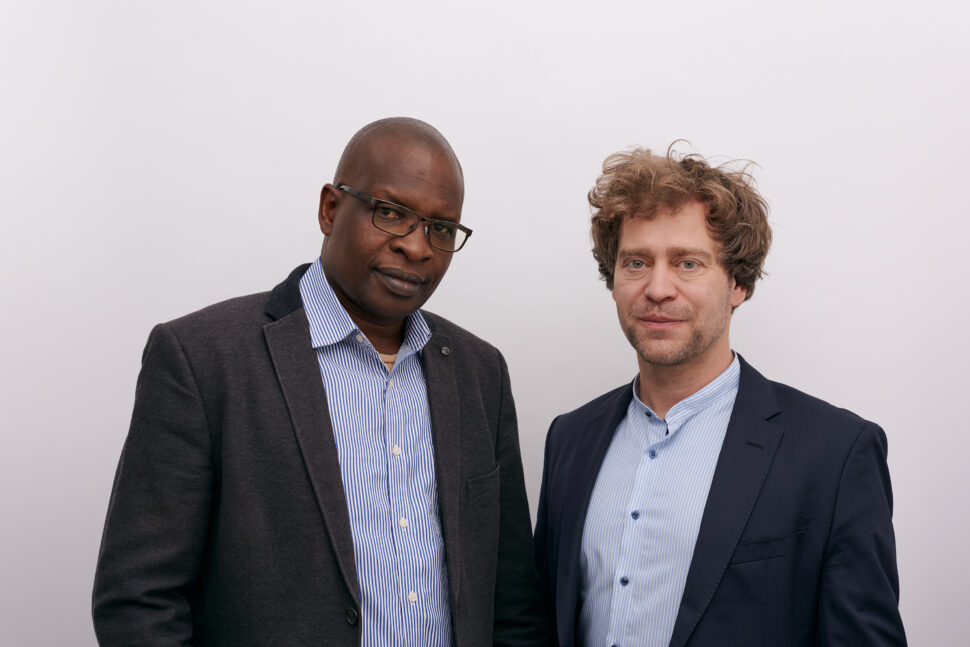Even faster and more effective: our new African-German Executive board
Tinega Ong' Ondi and Christian Griebenow are now two experienced directors jointly managing the Executive Board of Directors of VSF Germany: As Regional Director in Nairobi, Tinega is in charge of the projects in East Africa, while Christian continues to take care of business matters from Berlin as Managing Director.

© Sophie Valentin
“Decide together – take responsibility together” is the new motto. A change to the statutes, which was decided in September 2023, improves the work of VSF Germany. Newly distributed responsibilities ensure that we are able to act even faster. This is necessary for an organisation that provides humanitarian aid. After all, wars, droughts, epidemics and other disasters often require a rapid adjustment of our project processes.
In order to further increase flexibility and thus the effectiveness of the implementation of humanitarian and development aid projects, a new statute was adopted on December 4th, 2023. Thanks to the adjustment contained in it, the organisation’s business is now managed by a full-time board of directors. This is determined by the honorary supervisory board, which was elected by the ordinary members.
What else is new?
Important decisions are made jointly. With the new equal representation of the board with experienced directors from the project area and the office in Berlin, we are strengthening our international orientation and improving communication between country offices, regional offices and HQ.
Why this is important and how it will strengthen our commitment to healthy animals, healthy people and a healthy environment was explained during the interview with Christian and Tinega:
Tinega, you represent VSF Germany as Regional Director in East Africa. Now you are also a member of the VSF Germany Executive Board. What does that mean for your daily work?
“I am convinced that the cooperation between the head office in Berlin, the regional office in Nairobi that I manage, and the country offices will now become even closer. Our country offices are in Ethiopia, Kenya, Somalia, Sudan, South Sudan and Uganda. I coordinate their work from Nairobi by contacting the management teams of the country offices at least once a month. If changes are needed within the projects, the board is usually consulted. Now I am available as a direct point of contact. If there are major problems, I can now coordinate with Christian much more easily at any time. This makes the processes faster and more efficient.”
Does your new role give you more influence over project processes?
“We have always been in close contact with the head office in Berlin when ongoing projects need to be adapted – which happens relatively often. With some projects lasting only about one to two years, everything has to be well coordinated. The projects have to run smoothly, the local staff have to be trained and regular monitoring has to be ensured. All of this is easier if I can discuss it with Christian directly. And perhaps our new model will enable me to do more to ensure that other important projects continue: one example is the rehabilitation of child soldiers in South Sudan. The funding has ended, but the problem remains. It is very important to me to create a future for these children outside the military.”
Christian, you are now sharing the board with Tinega and voted in favour of this in advance. What are your reasons?
“We do not send experts to project countries, but work with our experienced colleagues on the ground. A regular exchange of views between all those involved at eye level is therefore a must for us. This is the only way to assess the need for humanitarian aid in a timely and accurate manner. The One Health approach is about the health of people, animals and the environment. With Tinega on the board, programme expertise is now also formally present at the highest level of the association’s management. At the same time, the new organisational structure means that more responsibility is being given to the project countries. This is something innovative in the field of humanitarian aid. For me, it means that I am relieved of some of the decision-making.
It sounds as if the new VSF Germany board is something special!
“In a way, yes. There may be other NGOs with boards that are equally represented, but as far as I know, we are the only ones with a board in which Africans and Europeans are equally represented. However, internationally oriented cooperation is increasingly becoming the standard in organisations that provide humanitarian aid worldwide.”
A pretty complex topic for a formerly “small” organisation! Has VSF Germany changed?
Christan: “Yes, and they are good changes! Since 2018, we have been a member of the German Foreign Office’s Coordination Committee for Humanitarian Aid. Our projects are largely financed with institutional funds from the United States, the United Nations, the EU and Germany. As a member of the umbrella organisation Vétérinaires Sans Frontières International, we are also very committed to animal welfare, veterinary disaster relief and the fight against neglected tropical diseases. We have long been a medium-sized organisation. And a very effective one at that. This has also been confirmed by the German consumer organisation Stiftung Warentest Finanztest.
Tinega: “I can confirm that all VSF Germany projects are dedicated to animal welfare. For people in East Africa, animal husbandry is often the most important source of food and income. However, in most countries in the global south, there is a massive shortage of veterinarians in rural areas. That is why we train animal health workers. Together with them, we are working to improve animal health through species-appropriate husbandry conditions and education, and to create a basis for health care. VSF Germany is also very active in the fight against rabies. And we are committed to improving access to water and food in drought-prone regions – for animals and for people.”
***
The interview was conducted by Dr Beate Grübler of med media Redaktionsbüro.